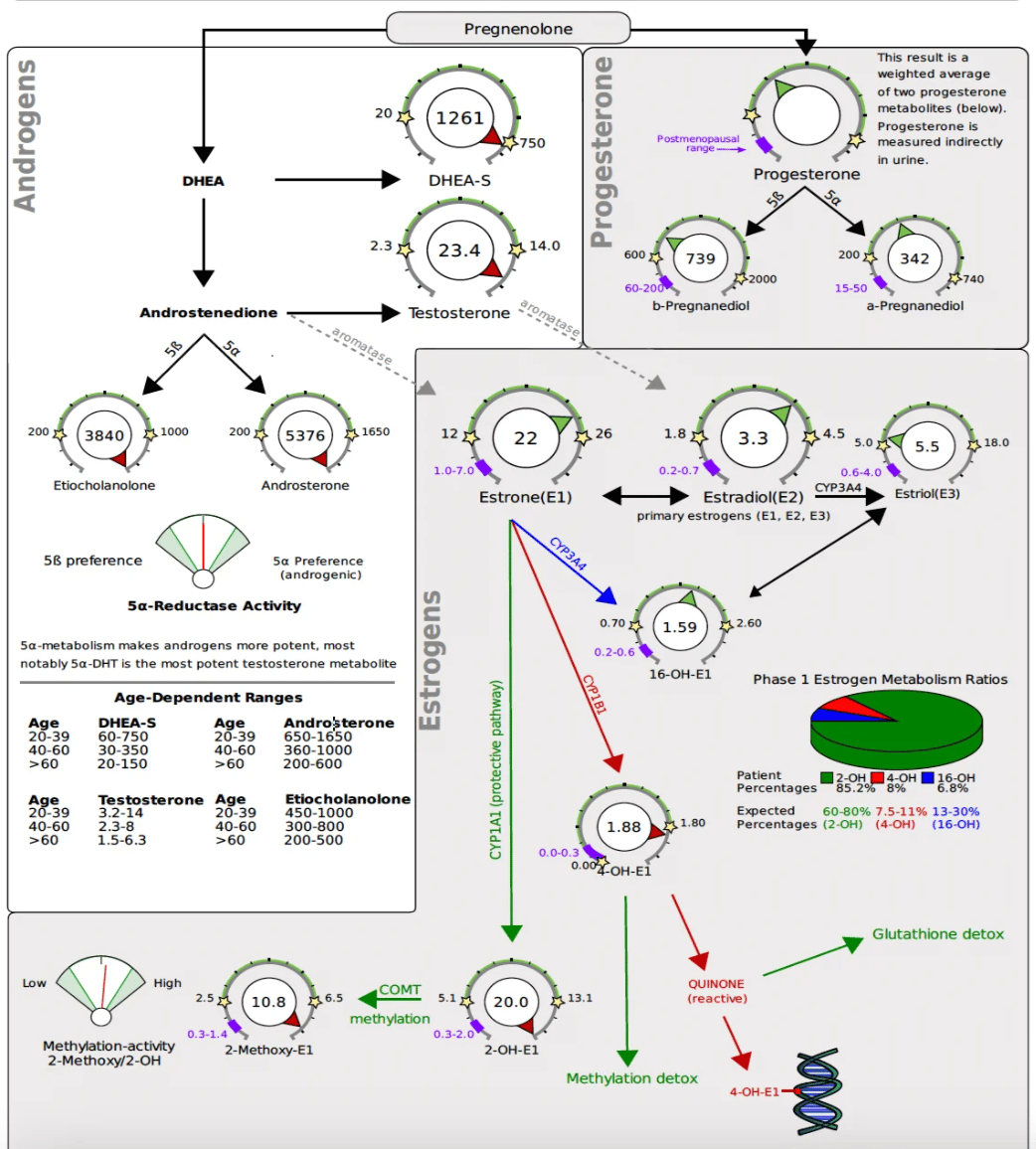- More Relief. Less Medication.
- Posts
- 🧠 How Hormones Trigger Migraine Symptoms...
🧠 How Hormones Trigger Migraine Symptoms...
And it's not just because your menstrual cycle is about to start...

Your hub for natural migraine management. More Relief. Less Medication.

Hey Migraine Mentees 👋
Today’s newsletter takes 7 minutes and 15 seconds to read, but if you’ve only got 60 seconds, here’s what you need to know:
Hormones can be both your friend and enemy…
Estrogen and cortisol (stress hormone) share a common pathway that can impact their effects…
There are two ways to balance your hormones - Injections or natural supplementation…
You are in the driver’s seat with how you want to approach your treatment…
This is one of our favorite topics to discuss, so enjoy!
🧠 The Migraine Mentors
First time reading?! Sign up HERE.

In This Week’s Edition…
🥡 Weekly Take-Out
Meme of The Week - Weather Changes Can Change You…
📸 Weekly TikToks
The Failure of The Medical Establishment in Treating Migraine
The 5 Most (un)Common Migraine Symptoms
🔈️ The Migraine Mentors Minicast - Podcast Series
Hormones and Migraine - Here’s The Connection
💣️ This Week’s Sponsor
1440 - Want The Truth? You Can’t Handle The Truth!
📜 This Week’s Top Article
How Hormone’s Cause Migraine Symptoms
🍴 Migraine-Friendly Recipe of the Week
Zucchini and Basil Soup

🥡 WEEKLY TAKE-OUT
Meme of The Week


🥡 WEEKLY TIKTOKS
The Failure of The Medical Establishment in Treating Migraine
@headache_whisperer #migraine #chronicillness #headache #migraineawareness #migraines
The 5 Most (un)Common Migraine Symptoms
@themigrainementor #creatorsearchinsights #migraine #migraines #headacherelief #chronicheadaches #chronicmigraines #chronicmigraine #pain #health

🗞️ MIGRAINE MINICAST
Hormones and Migraine - Here’s The Connection
Great… It’s that time of the month again…
⁉️ Ever wonder “Why does this always happen to me?!”
You’re not alone…
🎧️ In this week’s podcast episode, we discuss the intimate relationship between hormones, stress, and migraine.
We also go into detail about how you can manage all of these to overcome your symptoms and finally get to the root cause!
🚀 You won’t want to miss this one…
👇️ Click the link below to check it out! 👇️

Receive Honest News Today
Join over 4 million Americans who start their day with 1440 – your daily digest for unbiased, fact-centric news. From politics to sports, we cover it all by analyzing over 100 sources. Our concise, 5-minute read lands in your inbox each morning at no cost. Experience news without the noise; let 1440 help you make up your own mind. Sign up now and invite your friends and family to be part of the informed.

📜 TOP ARTICLE - THIS WEEK’S PRO TIP
How Hormones Cause Migraine Symptoms
One of the most common things we hear about migraine attacks is they happen around the time you menstruate…
If this is you, then this post is for you!
In this article, we will cover why it happens, how to test it, and most importantly, how to fix it…
Let’s get into it!
👬 Stress and Estrogen - The Dynamic Duo
One of the biggest things to understand about migraine attacks around your menstrual cycle is how stress and estrogen affect each other.
Both estrogen and your main stress hormone (cortisol), are made from the same molecule: DHEA.
When you’re under a lot of stress, you make a lot of cortisol…
And when you make a lot of cortisol, you deplete the stores of DHEA, which is needed to make estrogen and carry you through a normal menstrual cycle.
The lack of estrogen during a cycle is a problem, as falling estrogen levels can cause the following issues:
Decreased serotonin production (your body’s main feel good chemical)
Decreased endogenous opioid production (your body’s main way of creating pain blocking hormones)
Decreased ability to control vascular tone (when estrogen falls, you feel more pulsing during an attack).
So, we know falling estrogen is bad… And we know stress makes this problem worse…
What do we do about it?
There’s 2 main ways of going about treating these imbalances.
1 - The Injection route.
2 - The supplement route.
Both can work, but we’ll outline to pros and cons of each…
💉 The Injection Route
Pro’s
Typically works faster
Sometimes covered by insurance
Injection every few months
Con’s
Usually based on a single reading which may be an incomplete snapshot of the entire system
If you dosage is wrong you’re in for a tough ride
You’ll probably be on them for a long time
💊 The Supplement Route
Pro’s
You have the ability to adjust dosages if you get them wrong the first time
This strategy is designed to recalibrate the hormonal system so you don’t have to take them forever
Testing is more comprehensive and assesses hormones at various points throughout the day, allowing for more specific dosing
Con’s
Lots of supplements
Takes longer than injections to work (3-6 months)
Testing and supplements not covered by insurance
Below is an example of a test called a DUTCH test we routinely use to assess hormone function.
It might look complex (and yes, it is…), but it can give us A TON of information to understand why hormones and migraine symptoms are present.

As you can see, there’s a lot going on… And luckily for you, it’s OUR job to interpret this test and share the learnings with our patients.
The information from the DUTCH test allows us to treat the root cause of hormonal imbalances instead of just trying to treat the symptoms…
While some may prefer the quick and dirty approach, others may opt for a more holistic and natural route… And that’s completely up to the you.
If you’re someone looking to travel down the holistic and natural route, click the button below to set up a consultation with one of our doctors at The Neural Connection to see if this type of testing would benefit you!

🍴MIGRAINE-FRIENDLY RECIPE
Zucchini and Basil Soup

🥣 Ingredients
Zucchini
Fresh zucchinis are low in histamines and are known to be generally safe for those who suffer from migraines. They provide fiber and vitamins without common triggers.
Fresh Basil
Basil is naturally low in histamines and can add flavor without the need for potentially problematic seasonings or spices. It is also believed to have anti-inflammatory and calming effects.
Vegetable Broth
Opt for homemade or a low-sodium, additive-free version to ensure there are no hidden histamines, such as those found in yeast extracts or artificial flavorings.
Onion
While onions can be a trigger for some, they are generally tolerated well in small amounts for those sensitive to histamines. They add natural sweetness and depth of flavor.
Garlic
Like onions, garlic is low in histamine but should be used cautiously if you’re unsure of individual sensitivity as garlic can sometimes be a migraine trigger. It adds flavor complexity and has potential health benefits.
Olive Oil
This healthy fat is a great option for cooking and is low in histamines.
📖 Instructions
Sauté Onions and Garlic
Heat a small amount of olive oil in a pot over medium heat.
Add chopped onions and minced garlic, cooking until the onions are translucent. This forms a flavorful base without needing processed seasonings.
Add Zucchini and Broth
Chop the zucchini and add it to the pot.
Pour in the vegetable broth. Ensure the zucchini is covered.
Bring the mixture to a simmer and cook until the zucchini is soft.
Blend with Basil
Once the zucchini is tender, remove from heat.
Add fresh basil leaves. Using an immersion blender or a standard blender, purée the soup until smooth, incorporating the basil into a creamy green soup.
💪 The Health Benefits
Why It’s Migraine and Histamine Friendly
Low in Processed Ingredients
The recipe is free from common processed ingredients, such as stabilizers or preservatives often found in packaged foods, which may trigger migraines and are high in histamines.
Fresh Produce
Using fresh ingredients helps avoid aged or fermented components known to increase histamine levels.
Minimal Seasoning
By enhancing flavor with herbs like basil rather than spices or stock cubes, the risk of triggering migraines is reduced.
Please remember that individual tolerances can vary significantly… So listen to your body and assess how it responds to your meals.
🥼 It’s always a good idea to introduce new ingredients slowly and consult with a healthcare provider or dietitian specialized in managing these conditions!

How did you like this week's email? |

